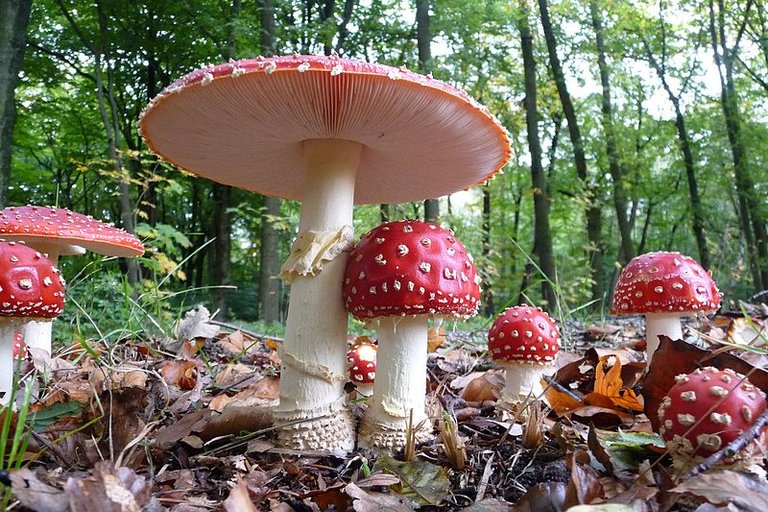
That is a dangerous question to be asking maybe. It feels like it to me at least. As I have been told from when I was very young NOT to touch that beautiful mushroom with the red hood and the white dots that we sang songs about, of a little gnome sitting on one. It seemed so appealing yet every time I came close alarm bells would start ringing, because of the many warnings I had had.
Now that I am older I don't sing the song about the gnome on the mushroom anymore, but the fly agaric still holds a lot of attraction for me.
Recently when I went to do the laundry at my neighbours house, I spotted a bag full of fly agaric mushrooms. Quickly I went to ask what he was going to use them for. 'Tripping' he said. I told him, 'But hey they are deadly you know!' He told me that he thought that was nonsense, that people had just been made to believe that as it was a mind opening hallucinogenic and the authorities didn't want nobodies minds to open. Interesting laundry trip that was.
Fly agaric is actually toxic.
The primary toxins in this mushroom called Amanita muscaria in Latin, are ibotenic acid and muscimol, which are both water soluble. So if you want to eat them without tripping afterwards, you have to boil them in a lot of water. Adding salt and vinegar to the water helps to draw the toxins out. Apparently in history the Siberians used to cook their fly agaric mushroom and drink the water to get drunk. Now I don't know anything about the measurements for these practices so don't go trying this on my account!!! I think I might challenge myself to trying to boil the beautiful mushroom of my childhood fantasy, in a LOT of water with salt and vinegar and afterwards fry it in butter and eat it! I will try a small part to begin with and wait 20 minutes as it is said that if not all the toxins have left the shroom that's when you start tripping. Ooow exciting!!!How to recognise it:
'First off, fly agaric is one of the easiest mushrooms in the world to identify. Even though it has some color variation, like the yellow-orange one below, if you stick to the red and orange color phases Amanita muscaria is unmistakable.
Now white and light-yellow phase muscaria do exist, but I do not recommend messing with those. White amanitas are almost always deadly — the destroying angel chief among them — and mistaking a destroying angel for a white muscaria will be the last mistake you ever make.
And with the yellow ones, you can mistake muscaria for the more-toxic Panther Amanita, Amanita pantherina, which does not have a history of culinary use.'
This was such a good description that I couldn't have said it better myself and I have taken it from:
https://honest-food.net/eating-santas-shroom/
Anything you would like to add to the knowledgeables of this mushroom?
Do it in the comments!
Love Clara @wombloom

I am a very proud member of:




having overdosed in the past , i can assure you that mescaline is very toxic.
Oh, good to know! Thanks for the comment. How did the overdose happen if I may ask?
He said mescaline, not muscimol. Two totally different substances. Mescaline is from a cactus. Wonder if that is what he means or if he got them confused.
Let us know how it turns out if you try it. I’ve always been curious about it. We have lots of the white destroying angels here, but no red ones.
Yeah, good you noticed, they ARE different substances! I almost forgot about the challenge, Have to gather new courage now. Will let you know! Funny how the red ones don't grow over where you are!
thank you for the correction. just using memory not checking correctly!
a miss spent youth! looking for that nordic trip.those damn vikings